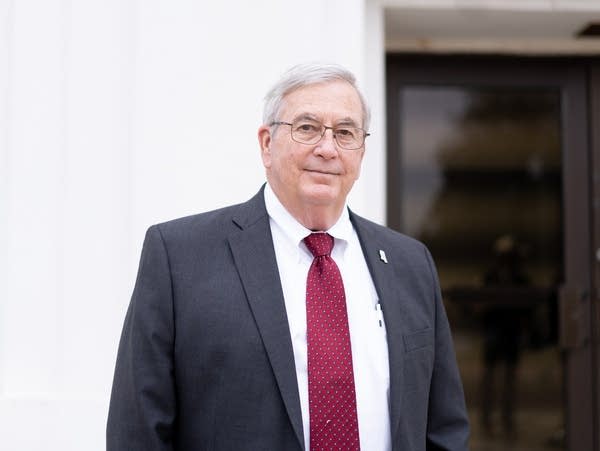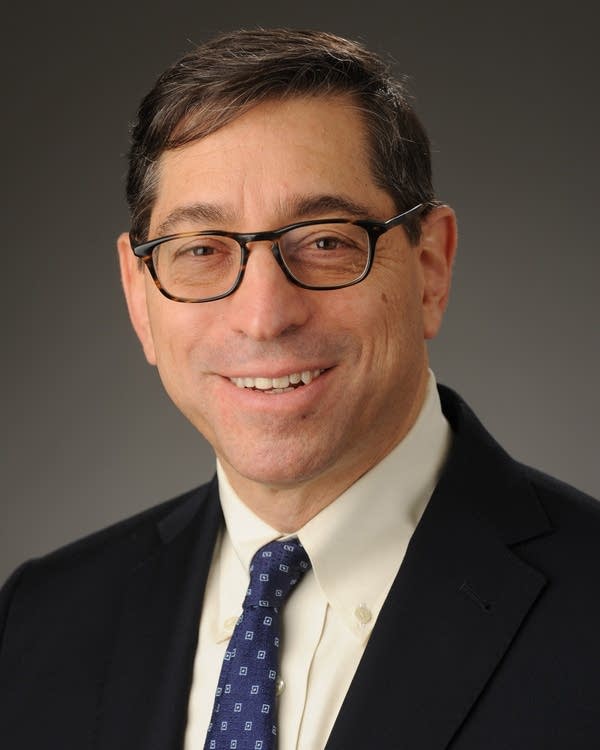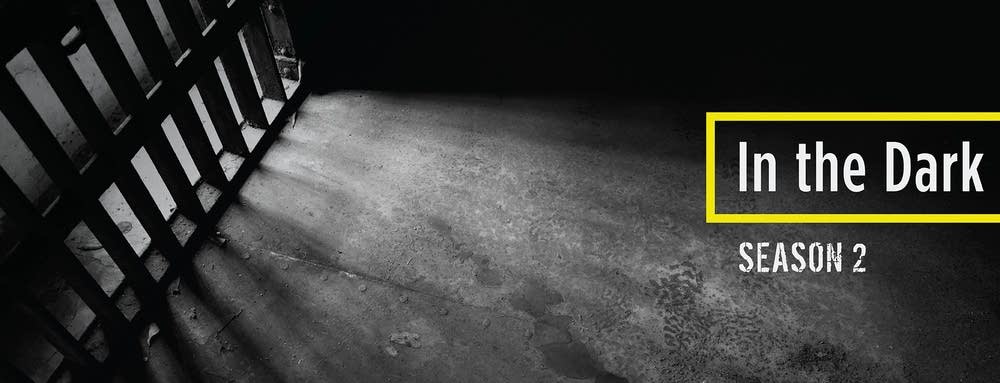Will Doug Evans face accountability?
Prosecutors across the country rarely face consequences for misconduct.

Curtis Flowers has gone free, but so has the prosecutor who relentlessly pursued him.
Flowers endured six trials, four death sentences and 23 years behind bars for a crime — the 1996 murders of four people at a furniture store in Winona, Mississippi — that he always said he didn’t commit. An investigation by reporters for In the Dark dismantled the evidence against Flowers, including two key witnesses who recanted their testimony implicating him. In September, the charges against him were dropped, and Flowers — now a free man — was finally vindicated by a criminal justice system that had wronged him for decades.
Yet the man most responsible for Flowers’ ordeal — District Attorney Doug Evans — has faced no adverse consequences for his handling of the case.
Evans is still the chief prosecutor in seven central Mississippi counties. He was reelected in November 2019 to another four-year term, running unopposed. Last month, a civil rights lawsuit filed against him over his jury selection practices was thrown out by a federal judge. According to the Mississippi Bar Association, Evans has received no public sanction and is still a lawyer in good standing. Evans couldn’t be reached at his office for comment.
“It shows how flawed the system is,” said American University Washington College of Law Professor Angela J. Davis, who researches the power of prosecutors (full disclosure: Davis has donated to In the Dark). “Evans is not an exception. He’s just an extreme example of what’s really wrong with the system in terms of holding prosecutors accountable.”

Prosecutors have enormous discretion to pursue criminal cases as they see fit. Their actions in any individual proceeding can be reviewed on appeal, but their overall conduct is rarely subject to oversight. In the Flowers case, courts have repeatedly found that Evans flouted the Constitution. Four of Flowers’ convictions were reversed on appeal, all because of Evans’ misconduct. Yet he was allowed to retry Flowers again and again.
During oral arguments before the U.S. Supreme Court in March 2019, the justices took issue with Evans’ pattern of striking Black prospective jurors in Flowers’ trials. Several commented on the distressing history of the case. Justice Samuel Alito — one of the high court’s more conservative members and a former prosecutor — twice asked the state of Mississippi’s lawyer how Evans was allowed to keep pursuing Flowers and why the Attorney General’s Office hadn’t stepped in. “Well, could we say in — in this case, because of the unusual and really disturbing history, this case just could not have been tried this sixth time by the same prosecutor?” Alito said.
Assistant Attorney General Jason Davis, there to argue that the justices shouldn’t overturn Flowers’ most recent conviction, didn’t attempt to defend Evans’ conduct over the years. “The history in this case is troubling,” Davis conceded. He said the Attorney General’s Office lacked the legal authority to take over a case unless the prosecutor requested it. In other words, Evans would have to remove himself.
In June 2019, the Supreme Court, in a 7-2 ruling, overturned Flowers’ 2010 conviction, finding that Evans deliberately struck Black prospective jurors at the sixth trial. The majority was unsparing in its criticism of Evans’ conduct. Justice Brett Kavanaugh wrote in the opinion that Evans “was motivated in substantial part by discriminatory intent” and his “relentless, determined effort to rid the jury of Black individuals strongly suggests that the State wanted to try Flowers before a jury with as few Black jurors as possible, and ideally before an all-white jury.”
Two other courts had previously ruled that Evans had committed this same type of constitutional violation in Flowers’ case. And an analysis by In the Dark had found that Evans and his assistant district attorneys, over 26 years of trying a variety of defendants, struck Black prospective jurors at nearly 4½ times the rate they struck white ones.

The Mississippi Supreme Court had also twice found Evans guilty of a different type of misconduct during Flowers’ trials, leading to the reversal of Flowers’ first two convictions. Even the local judge in Evans’ district, Joey Loper, chastised Evans for his “dilatory conduct” after he was a no-show at Flowers’ December 2019 bail hearing. Loper suggested that Evans would “reap the whirlwind” if he didn’t change his behavior. Soon after, Evans agreed to recuse himself from the case, clearing the way for the Attorney General’s Office to take over and eventually drop the charges against Flowers for lack of evidence.
There are also the findings published by In the Dark that implicate Evans in other forms of wrongdoing. Evans put Odell Hallmon, now a convicted triple murderer, on the stand at four of Flowers’ trials to say that Flowers had confessed to him in prison. Hallmon later told In the Dark that his testimony was “a bunch of lies” and that he concocted it in exchange for favorable treatment from Evans in his own criminal cases, favors that Evans never disclosed to Flowers’ defense, as he was obligated to do. “I helped them. They helped me,” Hallmon said. “That’s what it all boiled down to.”
And then there’s Willie James Hemphill, a Winona man with a long history of violence, who spent 11 days in jail just after the murders. Hemphill told In the Dark that he was arrested following a manhunt, questioned by investigators and told that he’d been seen near Tardy Furniture on the morning of the murders. Hemphill said that law enforcement fingerprinted him and examined his Fila Grant Hill shoes, the same type of sneaker that left bloody footprints at the store. Evans never shared any of this information with Curtis Flowers’ defense team. Flowers’ lawyers have argued that both Hallmon and Hemphill are examples of Brady violations — the unconstitutional withholding of evidence favorable to the accused — which are a common contributor to wrongful convictions.
Evans has remained unapologetic. “It was a ridiculous ruling,” Evans said to The Winona Times after the Supreme Court’s ruling. “They basically said there was nothing wrong with the case and reversed it anyway.”
It seems unlikely that Evans will face consequences for his actions in the Flowers case.
Because district attorneys in Mississippi and all but five states are elected, Evans can’t be fired and he has no boss to reprimand him if he breaks the rules. And voters often have no power at the ballot box. A 2009 study by Ron Wright, a law professor at Wake Forest University, found that, in 10 states over a roughly 10-year period, 85 percent of incumbent district attorneys ran unopposed and, when they did face a challenger, won 69 percent of the time. In jurisdictions with small legal communities — like Evans’ — taking on an incumbent district attorney only to lose isn’t worth the risk for many lawyers. In most other countries, prosecutors are appointed.
And though Evans is bound, like all lawyers, by his bar association’s code of conduct, that code is broad and loosely enforced. Bar associations use disciplinary measures to censure private practitioners who steal their clients’ money and to purge from the profession attorneys who are themselves convicted of felonies. They rarely punish prosecutors, even in cases in which their misconduct violates the Constitution and results in the reversal of a conviction.
Prosecutors also have absolute immunity from lawsuits seeking money damages. In November 2019, lawyers from the NAACP Legal Defense Fund and MacArthur Justice Center filed a federal civil rights suit against Evans on behalf of his Black constituents. The suit sought only a court order forcing Evans to stop his practice of striking Black prospective jurors at a disproportionately high rate. It was a novel tactic that attempted to create a template for prosecutorial oversight moving forward. But the suit was dismissed last month by an Obama-appointed judge who, while noting that the claim of Evans’ racial bias “seems to be true,” ruled that federal courts shouldn’t interfere in state criminal proceedings.
Criminal justice experts say there’s no one reform that can hold prosecutors to account.

“It takes a lot of things,” said Bruce Green, a Fordham Law School professor and former prosecutor. “It takes trial judges to do their job and inquire into cases where the prosecutors might not be acting properly. It requires disciplinary authorities to be more robust. It requires legislators to look at the law. It requires elected prosecutors to conform to their ethical obligations. And it requires the press to look into what [prosecutors] are doing and write articles about prosecutors who look like they’re going astray.”
It was only after Flowers’ case received national media attention and was reviewed by the Supreme Court that Evans finally agreed to surrender the case. Green said more scrutiny has and will continue to lead to more accountability. “As long as the public cares, things are going to move in a positive direction,” Green said. “If you take the long view, things get better.”
Asked by In the Dark if there was anything he wanted to say to Evans, Flowers said no. “There are some things that just don’t need to be said. What’s understood is understood,” Flowers said. “I feel that Doug was wrong, and he knew he was wrong.”
Flowers lost 23 years of his life to prison — years he’ll never get back. The Tardy Furniture murders remain unsolved. The families of the victims have received no justice and no closure, and a killer may still be on the loose.
In the eyes of the law, Curtis Flowers’ case has been remedied. But the flaws in the criminal justice system have not. Evans has been back in court, prosecuting cases, as he has for nearly 29 years.
Davis, the American University law professor, says that’s why prosecutorial accountability matters. “Curtis Flowers is not the only person this has happened to. It’s happened before and it’s going to keep happening,” she said.
“Accountability matters, because there is another Curtis Flowers that you all just didn’t discover.”

